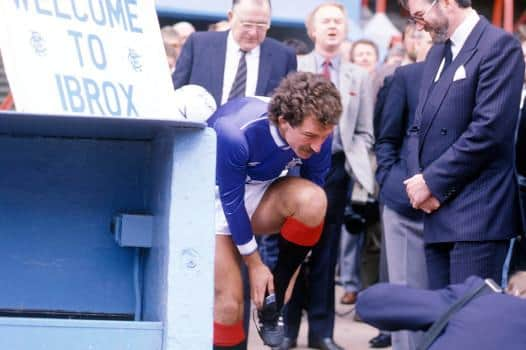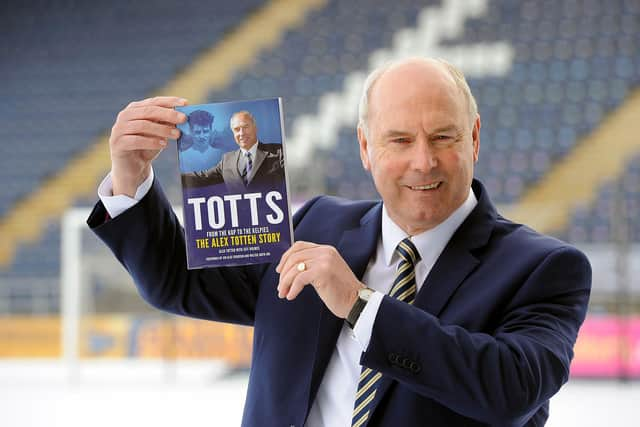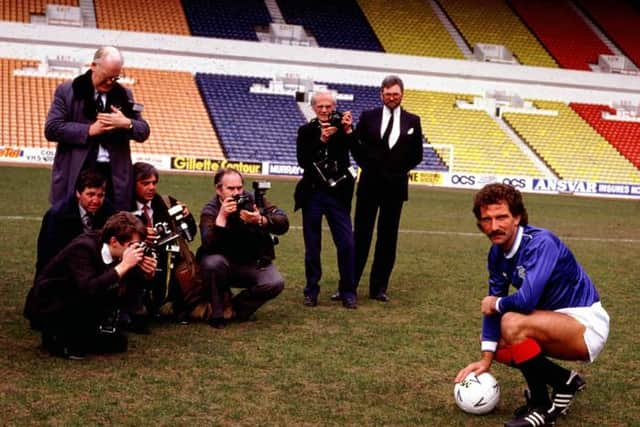'Jock had £600k, Souness got £16m - it changed overnight': Rangers assistant Alex Totten remembers witnessing Graeme Souness' arrival at Ibrox
The appointment of Jock Wallace’s successor this day in April 1986 proved to be a watershed moment in Scottish football, with an influx of high-profile players, six then seven-figure transfer fees, not to mention significant success at Ibrox.
Changes and improvements around the ground were implemented, Souness famously introduced Sir David Murray to the club while top talent from England in the Scottish Premier Division became commonplace – as would the three-time European Cup winner and Scotland captain in the centre of midfield.
Advertisement
Hide AdAdvertisement
Hide AdWallace had been sacked two days prior with Rangers fifth in the table, a position they finished in, some way off then leaders Hearts and eventual winners Celtic. Souness did not take over immediately, leaving Wallace’s assistant Alex Totten in charge for one match against Clydebank then bringing in Walter Smith as his own assistant to see out the remainder while his switch from Sampdoria was finalised.


Rangers would not finish so low in the top flight again after the changes implemented by Souness, and his legacy left a mark on Scottish football, and at Ibrox, for many years to come.
Alex Totten remembers being called into the Blue Room by chief executive David Holmes and then escorting the Scotland captain through the dressing room and around the squad he would be inheriting, but little did Totten know the seismic impact unfolding at the club, and Scottish football, as he went about his work.
“I suppose I was the first person to meet Graeme Souness the Rangers manager,” said Totten, now a fixture in the Falkirk FC commercial department. “It was some day with all the journalists - a full battalion.
"There were only three of us in the Blue Room - David Holmes, Souness and myself when he introduced me. I had never met him, didn’t know him and all of a sudden he said ‘pleased to meet you’. I remember he looked away and it was a bit embarrassing. That was it, more or less, the first to meet the new Rangers manager.


“Mr Holmes asked me to take him down to meet the players so we went round the dressing room - Peter McCloy, Derek Johnstone, Davie Cooper - introducing them all. He had a word for a few minutes and then he said he was heading back to Sampdoria.
“Later, Chick Young was outside and told me they were going to bring in Walter Smith. I wasn’t surprised - I didn’t know Souness from Adam and had never met him before. I was big Jock’s man.”
Wallace had already tipped off his assistant manager, who he had been priming as his successor, of the new arrival from Serie A as he left on the Monday following a 3-1 defeat to Hearts the previous week. But if Totten knew Souness was coming – he didn’t realise the impact of his arrival.
Advertisement
Hide AdAdvertisement
Hide Ad"I knew I’d be leaving but looked after things for the week before he came in with Wattie. Campbell Ogilvie explained Graeme wanted to bring his own people in and I understood – I told him ‘That’s fair enough, that’s what I did at Falkirk, I brought Gregor Abel in from Alloa’”, he recalled.


"So a week later I was out the door too, but on the Monday I chapped Souness’ door. He opened it a wee bit – he maybe thought I was going to have a go at him – and I wished him all the best, told him it’s a brilliant club and knew he’d do well.
“It just all changed overnight, almost. Big Jock had spent £600,000 in three years. Souness spent £16m. Among his first signings were Terry Butcher and Chris Woods – and everything changed then.
“It was definitely to the benefit of Rangers, but I’m not sure it was for Scottish football because everyone tried to emulate them by spending money.
“It was night and day the players he brought in – some great players. English teams were barred from Europe so he had a chance to bring some big names up to a big club and that’s what he did.
"Jock and I wanted to sign some big names but it never materialised but then to switch from £600,000 to £16m - it just changed. You just buy the best you can - and that’s why teams are top of the leagues now because they pay the most money.
"I left with no regrets, I had a great time there in Europe, world tours and two league cup finals. But Graeme Souness went on to have great success at Rangers too.”
Wallace had been setting in place a plan for continuity with his assistant assuming the top job, a plan that was halted, but later realised when Souness passed the baton to Smith in 1991 and moved to Liverpool amid Rangers’ march to nine-in-a-row.
Advertisement
Hide AdAdvertisement
Hide AdHe left behind a club revitalised from the lowly mid-1980s point when he arrived but couldn’t replicate the same success at the likes of Benfica, Blackburn, Newcastle or Galatasaray. Or at Anfield.
Now Souness is a seasoned pundit with Sky Sports’ English Premier League coverage – but not all change is for the better.
"I’ve spoken to Souness since, on the phone, which was nice - he has done well on Sky and talks a lot of common sense and I respect him and his opinions a great deal,” added Totten. “He speaks my language on football and not with all the new terms and new management speak. It’s all changed now in modern football – I was 22 years as a manager and kept everything clear and straightforward – I sometimes think they’re trying to re-invent the wheel.”
The ‘modern’ changes Souness began to make some 35 years ago however, continue to be felt.
Get a year of unlimited access to all The Scotsman's sport coverage without the need for a full subscription. Expert analysis of the biggest games, exclusive interviews, live blogs, transfer news and 70 per cent fewer ads on Scotsman.com - all for less than £1 a week. Subscribe to us today
Comments
Want to join the conversation? Please or to comment on this article.